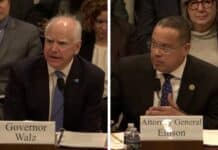It was supposed to be a done deal. The resolution to make Plymouth Minnesota’s newest “GreenStep City” was slipped into the city council’s consent agenda, clearing the way for expected approval by voice vote without discussion, along with no-brainer items like a temporary liquor license for the Lions “Live at the Hilde” event and minutes from the previous meeting.
After all, the staff pitched it as a free, feel-good “continuous improvement framework” for the thriving suburb.
The City will claim credit for having implemented and will work at its own pace toward implementing GreenStep best practices that will result in energy use reduction, economic savings, quality of life improvement, reduction in the City’s greenhouse gas footprint, and recognition by the League of Minnesota Cities as a GreenStep City.
But a funny thing happened on the way to the Twin Cities suburb becoming the latest domino in the Minnesota Pollution Control Agency’s “voluntary” plan to reduce its greenhouse gas footprint and make environmental sustainability the linchpin of city policy-making.
City Hall began hearing from residents who’d done their homework, including these emails included in the city council information packet.
“I believe that our elected officials should make decisions on each program or change in programs. Having an all encompassing agreement like green steps removes local control and flexibility,” wrote Rolf Erickson.
“This makes for terrible city planning,” wrote Terri Nelson. “…The only way to win this game is not to play.”
The city council also got an earful from several residents who made their case in person at the June 25 meeting designated for the program’s approval.
“It says it’s ‘voluntary’ and when you go through the various paperwork for it, it says ‘mandatory,’” Kathy Burkett told city councilors. “…The further you get back into this program it becomes required. So do not be fooled.”
“I feel like the taxpayers are the ones who are going to get squished because there’s so many practices you can choose from and so many things they want us to do,” said Terri Nelson. “And they all cost money and it’s all going to cost the taxpayer way too much, whether it works or not.”
In fact, the program includes more than two dozen so-called Best Management Practices with 175 different actions and lots of paperwork for participating local governments. Climate Adaptation and Community Resilience No. 29, for example, ties city policies and spending into the Metropolitan Council’s comprehensive plan required of municipalities.
Adopt a stand-alone climate adaptation/resilience plan; incorporate climate adaptation and resilience goals and strategies into the city’s comprehensive plan (or long-term vision or adaptation plan for Category B & C cities and tribes) using public engagement processes which must involve proactive outreach, stakeholder involvement, and meaningful engagement of vulnerable and underrepresented populations.
Based on the direction provided by an assessment of vulnerabilities and/or a comprehensive planning process, integrate identified climate adaptation/resilience strategies directly into city ordinances (such as strong land use and/or storm water regulations to protect or create resilient assets), operating procedures, and capital improvement or other budgets.
After the citizens stepped up, the mayor and city council stepped back. The GreenStep City resolution was not put to a vote.
“From my perspective, I don’t know nearly enough to make a decision whether we should be adopting this or not,” said Mayor Jeff Wosje.
Other city councilors were also clearly rattled by the implications for Plymouth’s autonomy, future and the policy strings attached to GreenStep grants.
“There’s a lot of information that was brought here. I’m frankly shocked from what I’m hearing on this,” said City Councilor Ned Carroll. “Please be assured no one’s going to tell this council what to do. No outside organization is going to tell us what to do.”
“I just don’t think we need to do this in Plymouth. We’re a great city. We don’t have to hop along with all these “great ideas” and be just like everybody else,” City Councilor Jim Prom said.
Some 124 Minnesota cities have become GreenStep Cities since the program’s inception in 2010. But the number of new participants has slowed markedly with six new cities joining in 2018 and just two in 2019 given the stunning rebuke from Plymouth.
This article was originally published by the Center of the American Experiment











